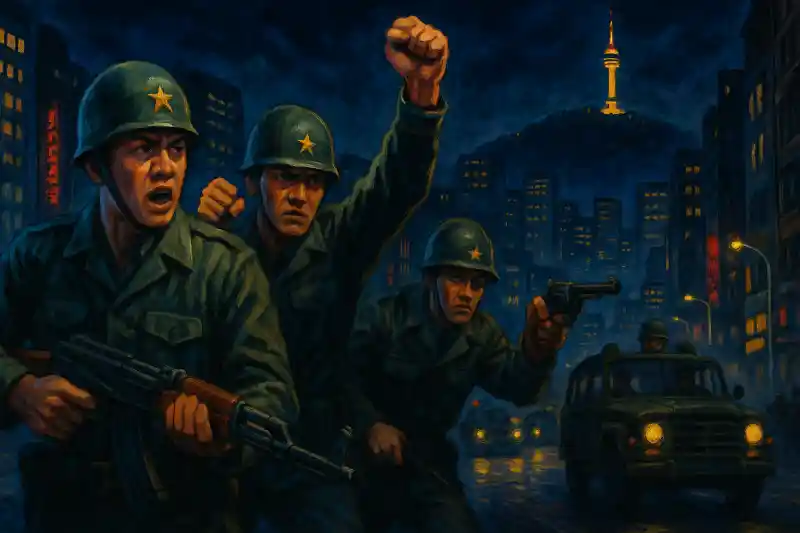“서울의 봄”: A Historical Drama That Shakes the Foundations of South Korea’s Past
A gripping portrayal of the 1979 December 12 military coup and its lasting impact on South Korean history and society
Hello, dear readers! Today, we dive into the powerful and intense world of “서울의 봄”, a South Korean historical drama that vividly captures one of the most turbulent moments in the nation’s past. This film not only entertains but also educates, shedding light on the complex political struggles of 1979 that shaped modern South Korea. Whether you’re a history enthusiast or a cinema lover, join us as we explore the film’s narrative, themes, and cultural significance. Let’s unravel how this cinematic work brings history to life and provokes thoughtful reflection on power, loyalty, and democracy.
Key Takeaways
- Historical Focus: The film centers on the pivotal 1979 December 12 military coup in Seoul, dramatizing a tense nine-hour conflict.
- Strong Cast & Direction: Directed by Kim Sung-su, featuring stellar performances by Hwang Jung-min, Jung Woo-sung, and others.
- Themes: Explores power struggles, loyalty, and political upheaval during a critical era in South Korea.
- Cultural Impact: Sparks reflection on South Korea’s political history and ongoing societal implications.
- Creative Approach: Uses fictionalized characters inspired by real figures to balance dramatic storytelling with historical context.
Table of Contents
- Introduction to the Film
- Historical Context
- Creative Team and Cast
- Themes and Messages
- Cultural Impact
- Critical Reception and Controversies
- Future Outlook
- Conclusion
Introduction to the Film
“서울의 봄” (12.12: THE DAY), directed by Kim Sung-su, is a gripping South Korean historical drama that captures the intense nine-hour period from the evening of December 12, 1979, to the early morning of the next day. The film dramatizes the military coup led by the fictional character Jeon Du-gwang, inspired by real-life figures such as Chun Doo-hwan, and the fierce conflict between the coup forces and the government’s suppression forces led by Lee Tae-shin, a character based on figures like Jang Tae-wan. The narrative vividly portrays the power struggle that shook Seoul and altered the course of South Korean history.
Historical Context
The film is set against the backdrop of South Korea’s political turmoil following the assassination of President Park Chung-hee on October 26, 1979. This assassination triggered a volatile power vacuum and intense political maneuvering. The December 12 military coup, which the film centers on, was a decisive moment when military factions led by the so-called “Hana Group” mobilized to seize control, ultimately shaping the nation’s future political trajectory. The film’s timeline compresses these events into a tense nine-hour window, emphasizing the immediacy and gravity of the conflict.
Creative Team and Cast
Director Kim Sung-su, known for his meticulous approach to historical dramas, brings authenticity and emotional depth to “서울의 봄”. The film features a powerhouse cast including Hwang Jung-min as Jeon Du-gwang, Jung Woo-sung as Lee Tae-shin, Lee Sung-min, Park Hae-joon, and Kim Sung-gyun. Each actor delivers nuanced performances that highlight the personal and political tensions of the era. Their portrayals help humanize the historical figures and dramatize the stakes involved in the coup.
Themes and Messages
“서울의 봄” explores enduring themes of power, loyalty, and the struggle for control in a nation on the brink of change. The film highlights the clash between those seeking to seize power through military force and those striving to uphold order and democracy. It offers a nuanced examination of the complexities of political upheaval and the human cost of such conflicts. The title itself carries an ironic hope for a “spring” or new beginning amid a dark period of authoritarianism, reflecting the film’s underlying message of resilience and the quest for freedom.
Cultural Impact
By dramatizing a pivotal moment in South Korean history, “서울의 봄” serves as both an educational tool and a catalyst for reflection on the nation’s political evolution. The film’s use of fictionalized characters inspired by real people allows it to creatively explore sensitive historical events without direct confrontation, which some viewers find compelling while others may see as a limitation. Nevertheless, it provokes important discussions about democracy, military power, and historical memory in South Korea.
Critical Reception and Controversies
Critics have praised “서울의 봄” for its engaging storytelling, strong performances, and tight direction. However, some have expressed frustration over the film’s fictionalization of key figures, which, while enhancing dramatic effect, can blur historical accuracy. This creative choice has sparked debate about the balance between artistic license and factual representation in historical films. Despite this, the film’s emotional impact and its illumination of a dark chapter in South Korea’s past have been widely acknowledged.
Future Outlook
The success of “서울의 봄” is likely to encourage more filmmakers to tackle significant historical events in South Korea’s past, enriching the country’s cinematic landscape with stories that combine entertainment and education. As South Korean cinema continues to gain global recognition, films like this contribute to a deeper understanding of the nation’s complex history and cultural identity. Audiences can look forward to more nuanced historical dramas that challenge and inspire.
Conclusion
“서울의 봄” stands as a powerful testament to the role of historical dramas in capturing the essence of critical moments that shaped South Korea. By weaving a compelling narrative around the 1979 December 12 military coup, the film not only entertains but also educates and provokes reflection on themes of power, loyalty, and democracy. It invites viewers to consider how history’s shadows continue to influence the present and future. What lessons can we draw from this turbulent chapter to better understand the ongoing quest for freedom and justice?
For those interested in exploring more about South Korean cinema and historical dramas, check out our other insightful reviews such as K-Drama Tangerines Review and Karma: Korean Crime Thriller Analysis. To watch “서울의 봄” online, visit 12.12: THE DAY on On Demand Korea.
Learn more about the historical background on Wikipedia Seoul’s Spring.
